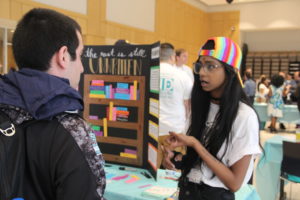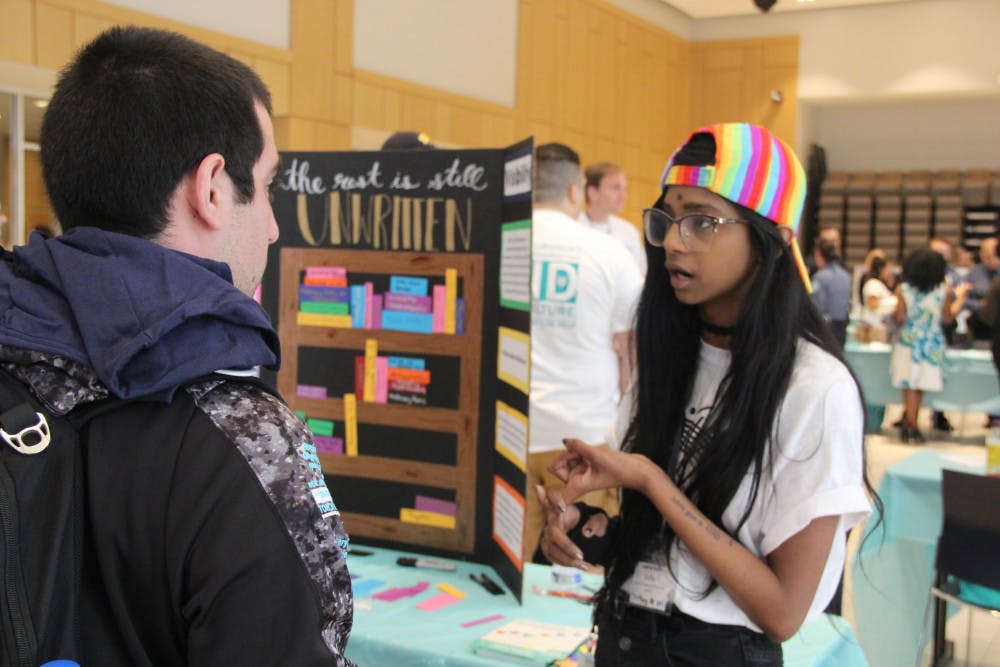By John McCarthy
Staff Writer

Students walked in and out of the Brower Student Center with name tags, flyers and a better sense of right and wrong at the College’s Anti-Violence Initiative’s annual Day to End Rape Culture expo, which was hosted on April 9 at 10 a.m. in the Brower Student Center Room 100.
The event was held in April, which is also Sexual Assault Awareness Month, in order to help better educate the campus community about rape culture, its consequences and how to prevent further perpetuating the concept.
Rows of tables were lined up throughout the room featuring exhibits that included student-run groups on different aspects of rape culture and the resources offered on campus for those seeking more information or support on the subject of sexual assault. The exhibits’ topics ranged from catcalling and stereotyping to victim-blaming and relationships. One group included a media literacy booth that played songs and even commercials that portrayed normalized themes sexual violence
“Day to End Rape Culture helps educate students about sexual violence and assault in an engaging way,” said Maggie Leppert, a senior sociology major and AVI victim support specialist. “We wanted to make it convenient for those who may not know a lot about rape culture to learn how to spot examples of it in their daily lives.”
The College has resources and support groups for students in need. During the event, different on-campus services had set up their booths set up to explain what kind of services they provide.
Toward the center of the room were tables for Student Health Services, Campus Police, Counseling and Psychological Services and other representatives of campus resources who were there to remind students that help is available for those struggling with sexual assault.
“It’s important to know what to say to those who are victims of sexual assault,” said CAPS staff therapist Robin Loonan.
Loonan facilitates a support workshop known as Survivors of Sexual Assault Feeling Empowered (SAFE) Group. The support group meets weekly and serves as a confidential and provides a safe place for people to talk about unwanted sexual experiences.
“This group gives those who are struggling with sexual assault a chance to feel supported and connect with those who also feel alone,” Loonan said.
At the booth, there was a list of quotes on what to say to those who are victims of sexual assault that were provided by members of the SAFE group. Written anonymously, the quotes aimed to educate others on proper ways to comfort those who are struggling from trauma of sexual violence.
Movements against sexual violence have recently become more prevalent due to high-profile cases and media coverage, specifically with the hearing of Justice Brett Kavanaugh late last year and the growing #MeToo movement.
Those who were victims would comment or hashtag the phrase “#MeToo” on Twitter as a means to break the silence on sexual assault.
AVI’s peer educator and junior psychology major Rachel Craig and senior marketing major Surbhi Chawla hosted a booth to discuss the history and importance of the movement.
“The expo setup is a good chance not just to learn more about sexual assault,” Craig said. “It also gives students a chance to show what they know and educate others.”
The booths worked to change the perception of rape culture and encourage dialogue on sexual assault, relationships, societal standards and overall safety.
“A lot of people are not fully aware what rape culture is,” said Emily Beggiato, a senior psychology major and Greeks for Change intern. “These booths shed light on how prevalent it is, and that’s really important.”







